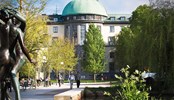EIJS mourns the loss of its first Director Jean-Pierre Lehmann
Born in 1945, Jean-Pierre was an extremely active person, traveling constantly and appearing as a keynote speaker at conferences worldwide. This was of course due to his brilliance as a speaker. I attended an informal briefing by JP for several high-level officials from the Swedish Ministry of Foreign Affairs. In just 45 minutes, he was able to update them on the situation in Asia from history to the present. He did this in an extremely interesting way, including detailed facts and without needing to rely on any notes or even preparing in advance. His presentation was highly impressive – both the officials and I were stunned!
At the time, Stockholm was of course too small and provincial for JP. The Faculty and Program Board at SSE still conducted their meetings in Swedish (which JP did not understand) although, as a professor, he was nonetheless required to attend. He was furious that they could not speak English and ultimately refused to attend. He imposed extremely rigorous demands on students, who he quickly realized were lacking basic knowledge after subjecting them to a quick quiz on Asia early in a course. Accordingly, his dissatisfaction with the Swedish education system began long before the present debate.
He also imposed extremely high demands on the people at EIJS. After having spent some days between Christmas and New Year alone at the institute, he sent an e-mail to everyone expressing his dissatisfaction. EIJS was an international institute where Swedish labor law should not apply. He felt we should maintain high intellectual standards and, above all, ensure that we were there and working at least as hard as he did. Unfortunately, this lead to serious health problems for JP, who had to undergo heart surgery and a bypass operation while in Stockholm. Although this did not prevent him from working as hard as he ever had, it did have consequences in terms of his temper – he was, to say the least, very explosive.
It was not for this, however, that he will be remembered, but for the warm way he cared for the staff on a personal basis. He will also be remembered for his broad mind and eagerness to move things forward. His presence brought visits by intellectuals, both Asian and Western, to Stockholm. Those of us who worked with him truly learned a great deal, although we might not have realized this until afterwards.
JP liked to have everything planed in detail. Organizing his first meeting with the Evian Group in 1995, he employed Marie Tsujita and sent her to France to visit the various hotels and try their menus before deciding where to go. On March 17-19, 1995 EIJS inaugurated the first of a series of roundtable meetings of the international economic organization in the Post-Uruguay Round Era at the Hotel Royal in Evian-les-Bains. JP would continue the work of the Evian group even after leaving EIJS in 1996 to become professor at IMD in Lausanne. Through this organization too, JP leaves his legacy. His values and struggle for a more equitable world economy have undeniably left their mark and influenced many people across generations.
In a sense, JP was ahead of his time and the areas in which his expertise was strongest, such as globalization, global governance, trade and development, the role of business in reduction of poverty and inequality and the socio-economic, cultural, and business dynamics of Asia are current topics today. He held roles in a number of public policy institutes and organizations. He was an adviser to governments and corporations, and a frequent commenter in the international media. He authored numerous books and articles, primarily dealing with globalization, Asia and international political economy.
Jean-Pierre Lehmann died from a rare and extremely aggressive form of cancer. He remained active until the end and was still teaching and speaking at conferences in October and November 2017. The last I heard from him was regarding the 25th anniversary of EIJS in September 2017. Unfortunately, he could not make it to Stockholm on that date but sent his congratulations and warm regards, telling me to stay in touch!
Our thoughts are with his wife Francoise, who we got to know well in Stockholm, as well as their children Alexandra, Fabrice and Mahout. In lieu of condolences, they would be grateful if anyone would like to share a personal memory of Jean-Pierre, however important or trivial, at memoriesofjeanpierre@gmail.com.
We certainly will remember him!
Marie Söderberg
Professor and Director of the EIJS.
P.S. Donations in JP’s memory can be made to Mercy Ships: www.mercyships.ch



